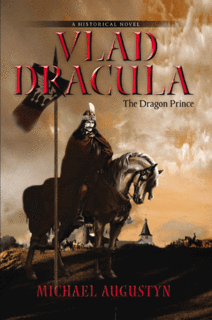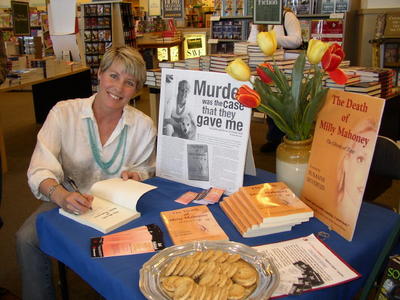Christopher Moore talks about his first time… publishing.
I thought it might be interesting to hear from some traditionally-published authors on how they became just that—traditionally published.
I just finished reading Lamb: The Gospel According to Biff, Christ's Childhood Pal by Christopher Moore and after checking out http://www.chrismoore.com/, I emailed Mr. Moore a few questions about how his first book, Practical Demonkeeping, came to be published.
Moore is the author of eight novels including Practical Demonkeeping, Coyote Blue, Bloodsucking Fiends, Island of the Sequined Love Nun, The Lust Lizard of Melancholy Cove, Lamb, Fluke and The Stupidest Angel. The Stupidest Angel won the 2005 Quill Award in the Science Fiction/Fantasy/Horror category.
Moore’s literary agent is Nick Ellison, who shows up on POD-dy Mouth’s list of great agents.
I kept the email short, asking only six questions, to help improve the chances of a response. Of course, when Mr. Moore wrote back in less than 12 hours (better than I do with my email), I wished I had asked a few more.
When you started writing Practical Demonkeeping was publishing it a thought that was always there or did that goal emerge later? If so, when?
I always had thought of publishing it. I started writing novels instead of short stories because I wanted to make a living at writing fiction.
You mentioned in another interview that you just followed the advice that the magazines offer, sending query letters to a ton on agents and then waiting. Was that a frustrating experience? What kind of feedback did you get from agents? Any particularly memorable rejections?
It was about as frustrating as I'd been led to believe it would be. They're not kidding about that. The first agent that accepted me wanted so many changes in the manuscript that I actually turned him down. That was tough. I ended up getting an agent through a connection with a friend who was in the TV business.
You mentioned that film rights to Practical Demonkeeping sold before the publishing rights did, was that through the same literary agent? How did being picked up feel?
No. It was sold through a Hollywood agent. It felt great. It was a ton of money. Would have been nice if they'd actually made a movie, but it was a ton of money.
How has your relationship with your agent (Nick Ellison) and publishers evolved since Practical Demonkeeping?
Nick has been great. He's been out there slugging for me for years, and I think we're pretty good friends. As far as publishers, I had mixed feelings about my first two publishers. I felt that they could have done a lot more with the books, but I felt as if they sorta didn't get what I was doing.
How involved were you in the marketing of Practical Demonkeeping? How has your involvement and approach to marketing your books evolved?
I was only involved in that I went to the few places that my publisher told me to go. I still do that, but they send me to a lot more places and a lot more people show up. I've also cultivated a pretty loyal following through the internet, as I've had my e-mail address on the books since 1995 and I make an effort to personally answer every letter I get.
What’s your latest project?
I've just finished a book about Death, called A Dirty Job and I'm starting the sequel to my 1995 vampire novel, Bloodsucking Fiends.
Check our Moore's website at www.chrismoore.com. He has several interviews available there including one on writing. There are some cool video interviews as well.
I thought it might be interesting to hear from some traditionally-published authors on how they became just that—traditionally published.
I just finished reading Lamb: The Gospel According to Biff, Christ's Childhood Pal by Christopher Moore and after checking out http://www.chrismoore.com/, I emailed Mr. Moore a few questions about how his first book, Practical Demonkeeping, came to be published.
Moore is the author of eight novels including Practical Demonkeeping, Coyote Blue, Bloodsucking Fiends, Island of the Sequined Love Nun, The Lust Lizard of Melancholy Cove, Lamb, Fluke and The Stupidest Angel. The Stupidest Angel won the 2005 Quill Award in the Science Fiction/Fantasy/Horror category.
Moore’s literary agent is Nick Ellison, who shows up on POD-dy Mouth’s list of great agents.
I kept the email short, asking only six questions, to help improve the chances of a response. Of course, when Mr. Moore wrote back in less than 12 hours (better than I do with my email), I wished I had asked a few more.
When you started writing Practical Demonkeeping was publishing it a thought that was always there or did that goal emerge later? If so, when?
I always had thought of publishing it. I started writing novels instead of short stories because I wanted to make a living at writing fiction.
You mentioned in another interview that you just followed the advice that the magazines offer, sending query letters to a ton on agents and then waiting. Was that a frustrating experience? What kind of feedback did you get from agents? Any particularly memorable rejections?
It was about as frustrating as I'd been led to believe it would be. They're not kidding about that. The first agent that accepted me wanted so many changes in the manuscript that I actually turned him down. That was tough. I ended up getting an agent through a connection with a friend who was in the TV business.
You mentioned that film rights to Practical Demonkeeping sold before the publishing rights did, was that through the same literary agent? How did being picked up feel?
No. It was sold through a Hollywood agent. It felt great. It was a ton of money. Would have been nice if they'd actually made a movie, but it was a ton of money.
How has your relationship with your agent (Nick Ellison) and publishers evolved since Practical Demonkeeping?
Nick has been great. He's been out there slugging for me for years, and I think we're pretty good friends. As far as publishers, I had mixed feelings about my first two publishers. I felt that they could have done a lot more with the books, but I felt as if they sorta didn't get what I was doing.
How involved were you in the marketing of Practical Demonkeeping? How has your involvement and approach to marketing your books evolved?
I was only involved in that I went to the few places that my publisher told me to go. I still do that, but they send me to a lot more places and a lot more people show up. I've also cultivated a pretty loyal following through the internet, as I've had my e-mail address on the books since 1995 and I make an effort to personally answer every letter I get.
What’s your latest project?
I've just finished a book about Death, called A Dirty Job and I'm starting the sequel to my 1995 vampire novel, Bloodsucking Fiends.
Check our Moore's website at www.chrismoore.com. He has several interviews available there including one on writing. There are some cool video interviews as well.


